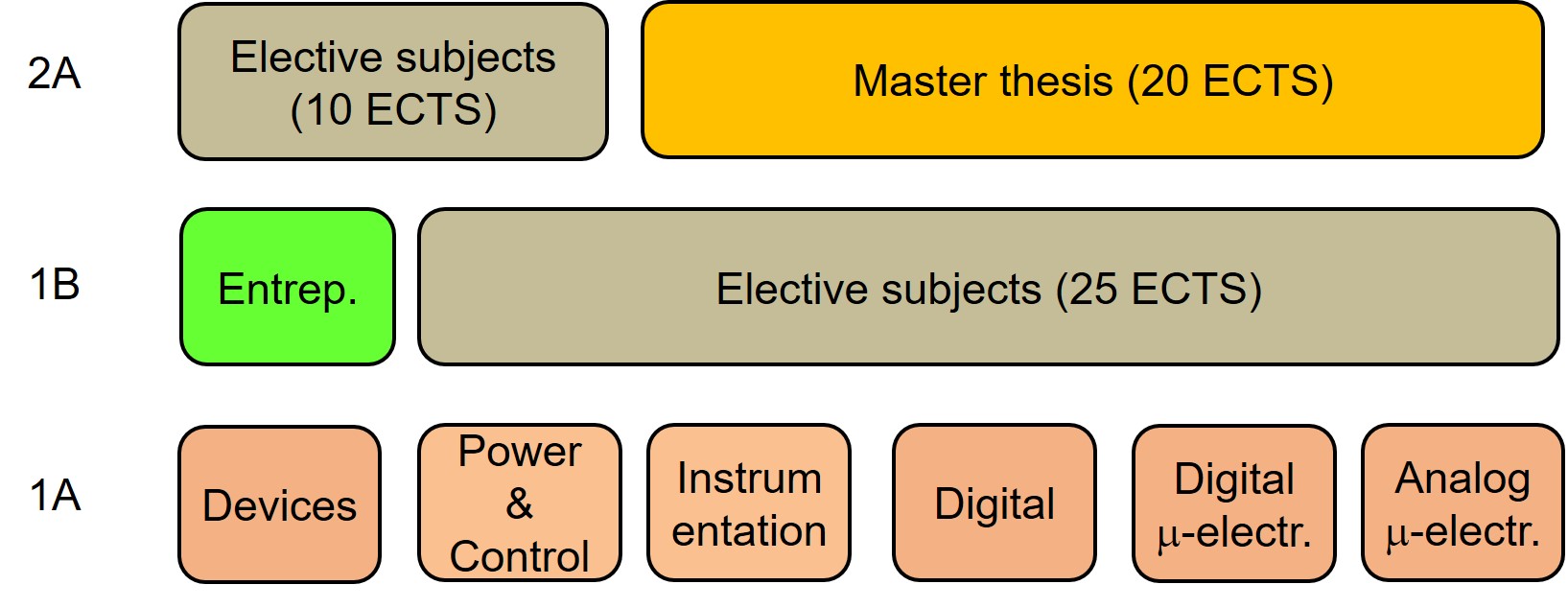The Master in Electronic Engineering (MEE) comes from more than 35 years of experience teaching electronics at master level providing graduates with a broad profile that includes skills and expertise in power, analogue and RF electronics, instrumentation and sensors, digital systems, micro and nanotechnologies and microelectronics. After the compulsory subject area, students can choose from a wide variety of subjects in order to acquire a general profile, specialise in a field or engage in research and pursue a doctoral degree. As a result, this master’s degree caters for the needs of two types of students: those who wish to focus on a professional career and those looking to pursue a doctoral degree in Electronic Engineering.
The aim is for the graduates to enter modern industry as benchmark professionals in a new multidisciplinary work and production scenario. To increase their employability, students can take both the master thesis and some of the ECTS credits for optional subjects in a company or laboratory.
MEE has a strong international character. It is taught entirely in English and attracts a large number of students from other countries.
The master's degree in Electronic Engineering is associated to content with a high labor demand. Typically, more than a half of our graduate students have been related to companies (internships or hired by them) before finishing the master. In addition, more than 90% of the graduates are working in full time jobs and it took less than three months after graduation to find the first position.
Given the cross-disciplinary nature of electronics, graduates of this degree may pursue careers in a broad range of sectors related to electronic technology.
The master is design for 90 ECTS corresponding to 3 semesters with a wide approach to electronics. We have 6 compulsory subjects covering deep knowledge about electron devices, power circuits and control, instrumentation and sensors, innovation management, embedded systems and digital and analog microelectronic (VLSI) design. Behind every subject, you can find a strong research group linked to the Electronic Engineering Department at UPC which has been involved in master studies for more than the last 35 years.
Apart from electronics, there is an additional compulsory subject related to entrepreneurship and business management which are also competencies needed for any engineer.
There are also 35 ECTS that can be fulfilled with elective subjects and internships in companies (10 ECTS). In this way, the student can specialize in any of the included tracks and can also gain experience in companies. As an alternative, for the students with a more academic profile, internships in research groups are also possible.
Finally, a Master thesis of 20 ECTS is defined. Typically, students that have been related to companies can extend their internship to develop the Master thesis at the companies which means that.
In the same way, the last semester allows students to do the last 30 ECTS at another university under any mobility program offered at the school.
In the following figure you can see the structure of the MEE master:

In case your background is not perfectly aligned with the contents of the core subjects of the master, bridge courses can be done. These bridge courses do not extend the length of the master, but they use elective credits. See the curriculum tab in this link for further details.
For more information you can contact the Head of Studies of the MEE (Juan Manuel Moreno Arostegui) capestudis.mee.etsetb@upc.edu
The master program comprises 35 ECTS of core subjects, 35 ECTS of elective subjects and a master thesis of 20 ECTS. Students may choose to take one of the academic pathways with intensification in one of the following topics: Embedded Systems, Innovation Management, Power Electronics, Semiconductor Technology, Microelectronic Design, Biomedical Engineering and Sensors, Green Microelectronics. Additionally, a track focused on Microprocessor Design shared with master MIRI at FIB is also available.
One and a half year, 90 ECTS credits
Starting September and February
Information about fees and payment options.
More information about grants and scholarships for the degree.
Afternoons. Face-to-face and blended learning.
English.
Holders of a degree, or students in the last year of studies of a degree, can apply for admission to the master in Electronic Engineering. An official degree certificate is necessary the day of registration, in September. Please check the general academic requirements for master's degrees at UPC-Barcelona Tech. Holders of a degree in:
Further information can be found on Barcelona School of Telecommunications Engineering (ETSETB)
The Academic year consists in 3 semesters, for a more detailed information check the following link
All the lectures and lab work are scheduled at the afternoons from 14:00-20:00. For a more detailed information check the following link
Academic coordination: Juan Manuel Moreno Arostegui
Contact mail: masters.etsetb@upc.edu
The master in Electronic Engineering is offered at the
Escola Tècnica Superior d'enginyeria de Telecomunicació de Barcelona (ETSETB),
member of Universitat Politècnica de Catalunya - BarcelonaTech (UPC).


